|
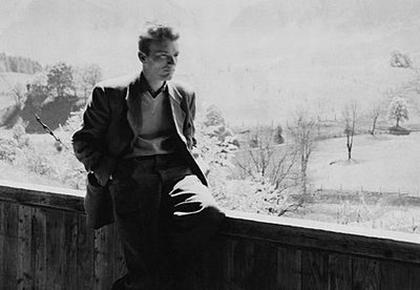
Thomas Bernhard
1931 - 1989
_______________________
Wittgenstein’s awkward nephew
Gabriel Josipovici on Thomas Bernhard
At his death, the whole of Europe apart from Britain (which, by contrast, took his more humourless disciple W G Sebald to its heart) was united in recognising him as one of the greatest writers of the second half of the 20th century.(....)
His speech on being awarded the Bremen Prize begins by alluding to the folk tale about the musicians of Bremen, but only in order to point out that "fairy tales are over, the fairy tales about cities and states and all the scientific fairy tales, and all the philosophical ones . . . Europe, the most beautiful, is dead; this is the truth and the reality. Reality . . . is no fairy tale and truth has never been a fairy tale."
How to live and how to make art in a world without fairy tales - without, that is, the animating myths that have kept us going for so long - that is the question. It is not one the prize jury or the audience wants to hear. Yet the more officialdom dislikes what he has to say, the more he will go on saying it, for that is his way of telling tales in a world from which tales have disappeared. The late interview from which I quoted is quite clear on this score:
Whatever you write it's always a catastrophe. That's the depressing thing about the fate of a writer . . . All you deliver is a bad, ridiculous copy of what you had imagined . . . It's especially hard in the German language, because that language is wooden, clumsy, disgusting. A terrible language that kills anything light and wonderful. The only thing one can do is sublimate that language with a rhythm to give it musicality.
Thank goodness for Thomas Bernhard, the most truthful, the funniest and the most musical of writers since Marcel Proust....(more)
_______________________
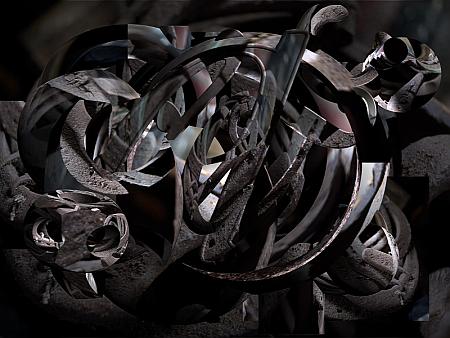
old poem I
Peter Ciccariello
invisible notes
Notes from the inbetween
_______________________
The H.D. Book [pdf]
Robert Duncan
Frontier Press 1984
...I am not a literary scholar nor an historian, not a psychologist, a professor of comparative religions or an occultist. I am a student of, I am searching out, a poetics. There are times when my primary work here, my initiation of self as poet in the ground of the poet H.D. and also my working of what is now a "matter of Poetry" (as the Arthurian lore is called the matter of Britain) and in turn an element in the great matter of the Creation of Man, there are times when my work has given way to literary persuasions and arguments, as if I might plead the cause of my life experience before the authorities at Nicaea and have my way, no longer heretical.... But just here I would admit those crossed lines, mixed purposes, almost of a literary scholar, an historian, a psychologist, a professor of comparative religions, overwriting the poet and the figure before us that we are striving to realize.
Where now we have only this one way to go, to the knotting and the untying of knots, moving along the line of our moving, the sometimes multiphasic sentence, we follow, trace of this coveted animal or animating power we address, crossing and recrossing its charm as if we could so bring in over into our human lot the form it is of a book we are writing or of a life we are leading, is the nucleus itself of our work which we fell as an impencing lure, the turning point where we are, leading us on.
via Free Space Comix: the blog
_______________________
Magnum Opus
The book that could save American art.
Jed Perl on The H.D. Book
I am besotted with a new book that is also an old book. This is The H.D. Book, by Robert Duncan, a wild, dazzling, idiosyncratic magnum opus that the poet composed between 1959 and 1964 and that is only now being published in its complete form, by the University of California Press. What began with a request for a brief birthday homage to the American poet known as H.D.—she had been born Hilda Doolittle—morphed into one of the greatest of all meditations on the nature not only of modern poetry but of the modern artistic imagination in its bewitching complexity. Art, Duncan exclaims, makes “what is not actual real.” I am glad to be reading Duncan’s text as we head into 2011—the second decade of the century after the modern century. There is no nostalgia in The H.D. Book. Duncan’s modernism is at once lofty, optimistic, activist, and open-minded. Published a half-century after it was written, The H.D. Book reads like a clarion call. At a time such as ours, when artists are either embattled or co-opted, either locked away in some ivory tower of their own invention or overtaken by market forces and political forces, Duncan argues for the most strenuous artistic ambitions as a dynamic democratic possibility....(more)
_______________________
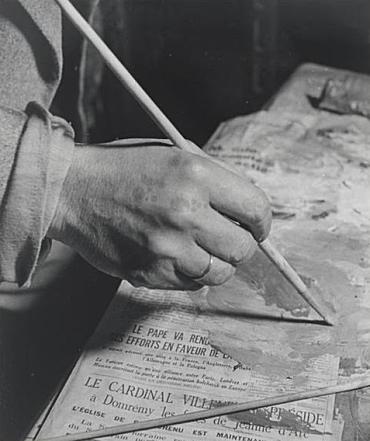
Picasso
painting over newspaper
Brassaļ
via
_______________________
An Excerpt from “Procession Seven”
Mikhl Likht
Translation from Yiddish by Merle Bachman
(....)
2
(Undiagnosed paralysis. Heartblind. Eros and
Psyche, New Yorked version.
Nineteen-twenty-threed. Black tapes around a
dramatic script.
Greeting from land to land. Boisterous queue:
“Czar Feodor” horshoed around in “Cherry
Garden.” Long stroll from there to there. Accidental
chill.
Communication courageless sought. Another one,
sought after. Courageous
still-silentness. We read Goethe’s Divan-Poems.
Assonance achieves dis.)
(....) ...(more)
Commentary
Jerome Rothenberg
(....)
What emerges in Likht’s work from 1923, as Bachman delivers it to us in English, is an extraordinarily complex & experimental poetry & poetics, far more radical in structure & content than all but a handful of his American counterparts & near contemporaries [Pound, Zukofsky, Williams, Cummings] & to some degree predating most of them.(....)
he is a potential figure of great interest for poets and scholars interested in a multi-ethnic American modernism. Likht was an avid reader and follower of modernist poetry in English, and translated numerous poems into Yiddish by writers as diverse as Carl Sandburg, Mina Loy, Ezra Pound, and Gertrude Stein. Perhaps his greatest achievement lies in the nine lengthy poems he published that he called ‘Processions.’ Pages long, they run through a gamut of styles and innovations and could justifiably be regarded as choice examples of the modernist ‘long poem.’”...(more)
_______________________

photo - mw
_______________________
Essays in Philosophy
Volume 12, Issue 1 (January 2011)
Love and Reasons
_______________________
ekleksographia #4
Emerging Native American Voices
Presented by Ahadada Books
via NewPages Blog
_______________________
Image [&] Narrative
Vol 11, No 4 (2010)
Photography and the book
_______________________
Those unfamiliar with automatic weapons might like to see the power of an object the State of Arizona allows a mentally-disturbed 22-year-old man to buy and carry concealed
- Tom Raworth
_______________________
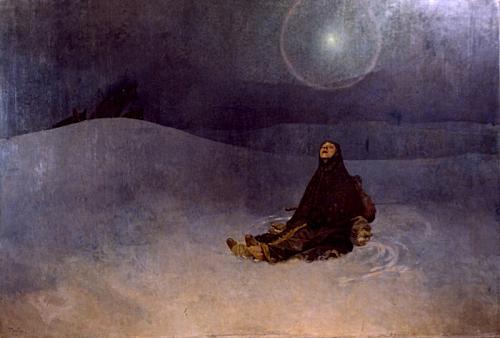
'Winter Night'
Alphonse Mucha
1923 _______________________
Empire Notes: US Interstates and States of Grief
Phil Rockstroh
December 29, 2010
Traveling US interstate highways one suffers a confluence of so much contemporary madness and tragedy extant in the land … so much suppressed fear and aggression. Yet, through it all, the heart still yearns to see what lies over the next horizon. Although, lamentably, what is revealed, all to often, proves to be as sterile, inhospitable, ugly, and inhuman as what was beheld at the last.
“Who has twisted us around like this, so that no matter what we do, we are in the posture of someone going away?” Rainer Maria Rilke
Any situation, as is the case with interstate highway travel, in which to momentarily stop or even to slow down, one risks death should be regarded as an affront (if not anathema) to common sense and the longings of the heart. When the landscape we pass through has been reduced to a meaningless blur, our lives grow indistinct as well.
The apologists of the present system tell us ad nauseum, and have convinced most, that a similar disastrous fate will befall the nation if the engines of global capitalism were to slow down even a bit. Interstate travel is emblematic of the manner a system based on ceaseless production and manic consumption degrades the senses and inflicts a dehumanizing assault upon the psyche....(more)
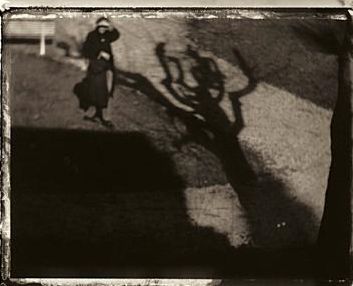
Ombre Portée
Sarah Moon: 12345
lens culture
Sarah Moon at Fotografiska Museum
Sweden
Sarah Moon interviewed by Frank Horvat
Paris, November 1986
Translation: Charles Martin
_______________________
Humanity without Feathers
Lynn Festa
... this problematic definition of man as a featherless biped raises questions central to the history of humanitarian sensibility and to the late eighteenth-century debates over the abolition of the British slave trade that will be my central focus below. For if one of the principles underlying humanitarianism involves the imperative to alleviate another’s suffering simply because that other is human, then the matter of who exactly will be understood and felt to be human (and based on what criteria) becomes a question of some urgency. This essay traces the way eighteenth-century abolitionists used tropes and figures borrowed from sentimental literature to delineate the parameters of the human. Sentimental texts furnished antislavery writers with the rhetorical tools needed to excite the “humanity” of metropolitan readers toward the suffering of enslaved people in distant climes—which suggests the second way the title “Humanity without Feathers” might be understood: to refer to the difficulty of making the humanitarian imagination wing across great distances to establish connections between local acts and distant suffering....(more)
Humanity: An International Journal of Human Rights, Humanitarianism, and Developmentinaugural issue
Statement of the Editorial Collective
(....)Most treatments of human rights, humanitarianism, and development—popular, scholarly, and activist—tend to remain tightly tethered to the agendas of the causes that gave them their original purpose and continuing energy. Our belief, as the editors of Humanity, is that the purposes of reflective activity and critique are not necessarily to refine and reform policies and to discover best practices. Advocacy and reform have their place, of course; but so too should analysis and critique, not just of methods, metrics, and goals but also of ideals and ideologies.
The mission of Humanity is to explore, from as many perspectives as possible, the multiple ways that invocations of “humanity” never tell the whole truth about the practices and people they defend or advance. For Humanity, “humanity” will always be a problem....(more)
via Somatosphere
_______________________
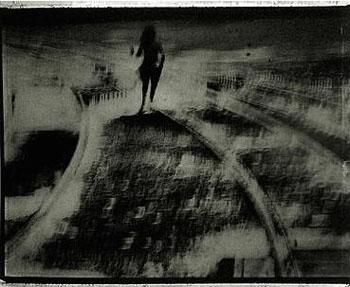
[ Circus ]
Based on the story of the Little Match Girl by Andersen
Text and photographs by Sarah Moon
_______________________
To Have Is to Owe
Mesopotamian usury, Vedic accounting, American Jubilee: excavating the history of fiscal debt.
David Graeber
Illustrations by Joanna Neborsky
Triple Canopy
_______________________
Fanon: The Wretched of the Earth Fifty Years On
Theory, Culture & Society
(Vol.27-7, 2010)
ifile pdf
_______________________
Radical Philosophy
Issue: 165 - January/February 2011
_______________________
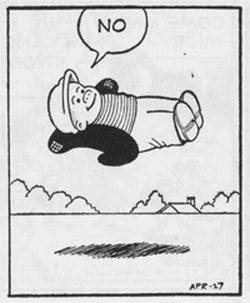
via
_______________________
The Cthulhu Cult of Capital
Anthony Paul Smith
An und für sich
(....)
Does anyone really believe THEY are worried about inflation? The current “jobless recovery”, a very soft name for a harsh reality, reveals the underlying vindictiveness of the capitalist class towards both the working class and the middle class, who inexplicably buy the austerity line. As they continue to magically make profits they refuse to redistribute that wealth along even the softest Social Democratic means and punish workers and professionals for something the capitalist class themselves caused. It’s a true anti-humanism and I finally gained some understanding of it through reading Alberto Toscano’s “Chronicles of Insurrection: Tronti, Negri, and the Subject of Antagonism” in the edited volume The Italian Difference: Between Nihilism and Biopolitics (available for free through the Open Access publisher Re.Press).
For some time now my working mythic-model for capitalism, especially through the technology of money, has been the Golem (which Hardt & Negri use in Multitude). However, if Tronti’s description of the separation of workers and capital is true, and it does seem to me to explain the current intentional attempts at a jobless recovery and destruction of any secure, non-precarious career for workers, then this myth doesn’t do it for me. Instead, capital is not a Golem, but Cthulhu and the capitalist class are his priests. It isn’t just the workers anymore, capital wants to be free from all humanity....(more)
_______________________
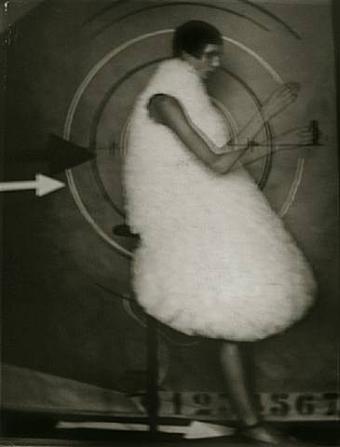
The Clock
Sarah Moon
_______________________
Why Big Media Wants to Kill RSS, and Why We Shouldn’t Let It
Kent Newsome
Anyone- and I mean anyone- who is concerned with the end user experience should be actively promoting and supporting RSS. Unfortunately, like the very important but much maligned climate control movement, those who favor RSS as a medium for content management are on the wrong side of the ledger. They are waging war against those who have deeper pockets and much to lose.
I can understand why someone who thinks of our eyeballs only as currency would not want us to manage several hundred web site subscriptions and the related content from a single, convenient, web-based app. I can understand why big media sites want us to click wildly from page to page and site to site, all in the name of page views and ad serves. Hell, even Google, who makes mint serving ads on so many web sites, doesn’t have much incentive to promote RSS and its handler, the wonderful Google Reader....(more)
.....................................................
Before getting too wrapped up in those wunderapplications now available on iPads and Blackberries, and before putting too much stock in Facebook and Twitter for your sourcing of online content, it may serve you well to heed the observations in this post. As the author notes, Firefox has basically killed the RSS subscription button, Chrome has no RSS reader, and the browsers are basically turning their backs on content syndication. And "if RSS dies, we lose the ability to read in private," argues Asa Dotzler.
- Stephen Downes
_______________________
Portfolios of the Poor:
How the World's Poor Live on $2 a Day
Daryl Collins, Jonathan Morduch, Stuart Rutherford & Orlanda Ruthven
portfolios
_______________________

photo - mw
_______________________
The Egg
Caleb JW Brasset
A writer made a little story shaped like an egg. He was proud of it and submitted it to a magazine. After a few months he forgot about it, and was writing other things. Then a rejection notice came in the mail. It was very respectful. Dear Contributor, it began, and went on to explain quickly that the egg shaped story had not been accepted. There was something else too: a short bit of advice from someone on the reading committee for the magazine. Good potential, it read. But I wanted more of a story. It was very personal, considered advice. It’s true that my story was very short, the writer said, feeling puzzled. But throughout it things are happening; that’s the story. Then out of nowhere appeared the image of an assistant editor. I’ve come to help you out, she said. She took the story in her hands. Hmm, she said. It’s true. There isn’t much story here. But it is a story, the writer said. It’s not a poem or an essay, it’s a story. Let’s see, the assistant editor said, turning the little story sideways. ...(more)
The Incongruous Quarterly
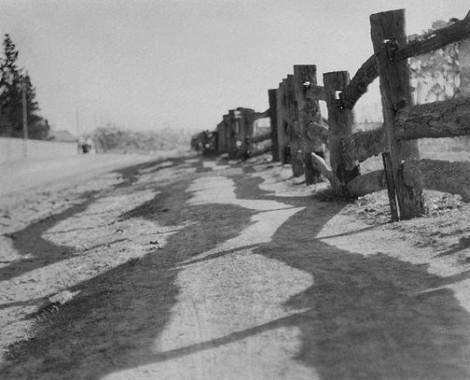
Shadow play
circa 1919
Harold Cazneaux
1878 - 1953
_______________________
Joy and desire surround us without our doing, without our understanding.
The world or what we term the world, that medium in which we find ourselves, and indeed whatever of it we set apart and term selves, is not related to what we make of it and not dependent on what we make of the world or make of ourselves. It is not in the least altered, nor is our basic nature altered, by any cosmology or culture or individual character we may devise, or by the failure or destruction of any of these, as all of them fail. If they seem for a time to succeed, they blind us as though they were real; and it is by our most drastic failures that we may perhaps catch glimpses of something real, of something which is. It merits our whole mind. The good society and the good life are more than we could imagine. To devise them or to assert and defend their devising is not the point.
William Bronk, "Copan: Historicity Gone"
from a longer selection provided by Ray Davis
_______________________
Digital Icons:
Studies in Russian, Eurasian and Central European New Media
Issue 4. War, Conflict and Commemoration in the Age of Digital Reproduction
Online Memories, Digital Conflicts and the Cybertouch of War
Adi Kuntsman
This opening essay addresses the political and intellectual necessity that enabled me to assemble this special issue. Firstly, I argue for the need to examine the role of digital media in negotiating and commemorating wars in countries outside of the USA and Western Europe and in languages other than English. Secondly, drawing on some recent developments in research on digital media, on one hand, and war, conflict and commemoration, on the other, I claim the importance of examining the two fields together. I argue for a complex approach that would capture the ways digital media and computer technologies affect the warfare itself, its social perception as well as the ways of remembrance and commemoration. I also present several theoretical concepts – cyberscapes of memory, digital battlefields, the aftermath, passionate politics and the cybertouch of war – and outline the structure of the special issue.
via Thivai Abhor_______________________

photo - mw
_______________________
On Maurice Blanchot and the Political
Zakir Paul, Ann Smock, Helen Tartar, and Jean-Michel Rabaté in conversation
86 minute recording
October 26, 2010
Slought Foundation
via Farhang Erfani
Continental Philosophy
_______________________
Philosophy in Rags: Rigour for a Dying World:
Houellebecq and Gnosticism
Hugh Graham
Philosophy in Rags: The Present Augustan Age:
Houellebecq and Gnosticism
Hugh Graham
_______________________
Six Questions for Charlotte Mandell
Translator of Zone by Mathias Enard
Scott Esposito
Conversational Reading
Video of Charlotte Mandell reading and discussing Zone by Mathias Enard
River of Consciousness
Stephen Burn reviews Énard's Zone
Excerpt: ‘Zone’ (pdf) I’ve never been so free, I own nothing now, not even my real name—I have an appropriated passport under the name of Yvan Deroy, born almost at the same as me in Paris and locked up a long time ago now in an institution for psychotics in the suburbs, he never had a passport and his doctors would be quite surprised to know that he’s wandering around Italy today, I got this document in the most legal way in the world with a record of civil status and a doctored electric company bill at the 18th arrondissement town hall: I’ve had so many different names these past years, on identity papers of all colors, I’ll become attached to Yvan Deroy, tonight the mute psychotic will sleep in the Grand Plaza in Rome, he reserved a room on the Internet from a cybercafé on the Champs- Elysées, Yvan Deroy won’t go see his Roman lover right away, he’ll hand over his last suitcase to whoever has a right to it, as they say, someone will come visit him in his room they’ll proceed with the exchange before Yvan Deroy disappears more or less for good, Yvan has had a new life since last month even an account opened in a big branch of an ordinary bank, which changes him from his postal savings account where his parents regularly deposit the price of his little extras in his “residence,” today he owns an international credit card—Yvan bought himself two pairs of pants and as many shirts in a big department store, withdrew cash paid in advance for one night in the Plaza and an airplane ticket he didn’t use and now he’s playing at making out the landscape in the gathering dusk, far from Venice from Alexandria from Cairo from Marianne with the white breasts a little closer to the end of the world thirty kilometers from Milan
_______________________
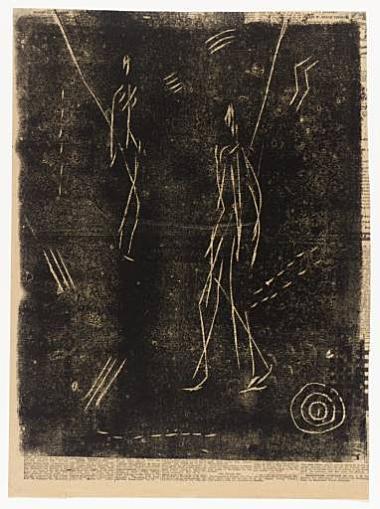
Figures and Signs
1953
William Turnbull
b. Jan. 11, 1922
_______________________
Rhythms of Memory
Robert Gibbons
One closes the book on autobiography after trawling through pages, a verb
only a Gloucesterman like Greg Gibson would apply to the process, or
another friend & mentor Peter Anastas, who sends one to Pasternak’s own
Safe Passage, where the young author abandons philosophy for poetry on a
train out of Marburg. Standing at margin’s edge, where life transpires like a
series of fragments & sentences rather than heartaches & joys, new memories
attempt to leap up & in. Although the image seen from the middle of the train
on the way from Mexicali to Guadalajara of a hundred cars snaking behind
on the curve of a mountain ridge matches exactly the number of cars hauled so
far in the distance ahead, as if the present may extend there & then, forever,
in between a past already lived, & future rushing forward without one, the
present changes places....(more)
Time Capsule
the killing floor
_______________________

Tides
1946
Barbara Hepworth
b. Jan. 10, 1903
_______________________
Media landscapes: Western Europe
a gathering at eurozine
_______________________
Unconventional Wisdom
A special anniversary report challenging the world's most dangerous thinking.
foreign policy
_______________________
The Web Is a Customer Service Medium
Paul Ford
ftrain
I call the people who say such things the Gutenbourgeois. They believe in the cultural primacy of writers and editors and they feel good—even a bit superior—about working in publishing. They believe it is their job to drive culture forward. The web, they are a little proud to admit, confuses them. They say: “We gave away all those short stories on our website but it sold no books.” Or: “We built a promo site for our famous author who does the crime novels and it was just a total boondoggle with no traffic.” Or: “The magazine can't get enough pageviews, even after we hired the famous blogger. Now management wants to make people pay for access.”
“Look,” I say, “maybe you're doing it wrong.”
“But,” they say, “we tweet.”
That's when I tell them about the fundamental question of the web....(more)
_______________________
ˇi˛ek and the Media
Paul A. Taylor
google books
Paul Taylor interviewed by Mark Thwaite
ReadySteadyBook
ˇi˛ek's work provides notions like "pretending to pretend to believe" to describe the hypocrisy with which people claim not to believe in regressive values (bureaucracy etc.) but still enact them anyway. Working in the university sector, he helped me understand the paradoxical situation whereby many purportedly left-wing academics shamelessly facilitate the commercialization of higher education. I'm sure RSB readers can relate to similar contradictions from their own working environments.
Today we are surrounded by rhetorical devices that nobody actually believes in but which nevertheless create a pathologically cynical and destructive lingua franca - one that Mark Fisher so brilliantly analyses in Capitalist Realism. ˇi˛ek's championing of otherwise ignored philosophical and psychoanalytical traditions produces a valuable ideology-critique. He powerfully highlights what is paradoxically hidden right in front of our noses - whether in international politics or the latest Hollywood blockbuster. Once you're in tune with his patented Parallax View it is difficult to see the world in quite the same way again - you start noticing the strangest things in the most unlikely places....(more)
_______________________
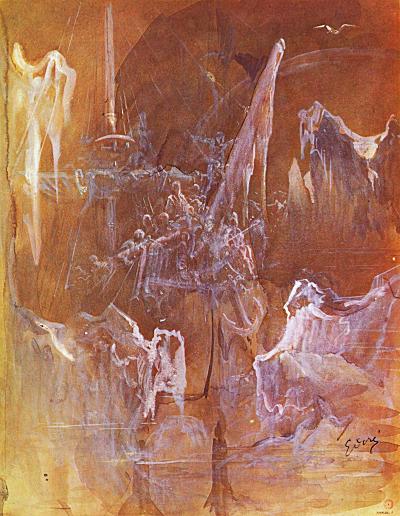
Ship among Icebergs
Gustave Doré
1876
_______________________
rural route two box two eighty one
volume one, issue two
featuring the work of James Luckett and Lydia Moyer
_______________________
Migration
Mathias Énard
translated by Charlotte Mandell
(....)
The engineer Mohsen has as his only company a thermos of tea, a cassette of Amr Diab songs on his car radio, and the shrill cries of jackals. The engineer Mohsen is not afraid. The engineer Mohsen knows this country well, he comes here often to check or repair the capricious little generator that supplies the region with electricity. He knows the crisp smell of snow mixed with the odor of fuel oil spreading from aluminum chimneys and he is well acquainted with the silence, the immense silence of this car-less region that the constant yelps of the jackals only deepen. The engineer Mohsen knows that it will take almost an hour to cover the forty kilometers that separate him from town, following the narrow, poorly plowed roads where paving is infrequent. The engineer Mohsen knows that he will not meet a single car, apart maybe from a motorcycle or a delivery vehicle jolting along driven by a mustachioed man wrapped in a red keffieh. The engineer Mohsen takes his time. He waits patiently for the engine (and in consequence the car’s interior) to warm up, drinking a glass of tea. A freezing wind has started to blow. It will be better lower down. The engineer Mohsen shifts into first and begins his descent.(....) ...(more)

In Cloth Fair,
next to Smithfield Market
detail
The Ghosts of Old London and A Room to Let in Old Aldgate
the Society for Photographing the Relics of Old London
held in the archive at the Bishopsgate Institute.
Spitalfields Life
_______________________
To The Stone-Cutters
Robinson Jeffers
Stone-cutters fighting time with marble, you foredefeated
Challengers of oblivion
Eat cynical earnings, knowing rock splits, records fall down,
The square-limbed Roman letters
Scale in the thaws, wear in the rain. The poet as well
Builds his monument mockingly;
For man will be blotted out, the blithe earth die, the brave sun
Die blind and blacken to the heart:
Yet stones have stood for a thousand years, and pained thoughts found
The honey of peace in old poems.

Robinson Jeffers
January 10, 1887 – January 20, 1962
photo at Tor House by Nat Farbman, 1948
Delusion Of Saints
Robinson Jeffers
The old pagan burials, uninscribed rock,
Secret-keeping mounds,
Have shed the feeble delusions that built them,
They stand inhumanly
Clean and massive; they have lost their priests.
But the cross-bearing stones
Still foot corruption, and their faces carved
With hopes and terrors
At length too savagely annulled to be left
Even ridiculous.
Long-suffering saints, flamelike aspirers,
You have won your reward:
You sleep now as easily as any dead murderer
Or worn-out lecher.
To have found your faith a liar is no thorn
In the narrow beds,
Nor laughter of unfriends nor rumor of the ruinous
Churches will reach you.
As at Clonmacnoise I saw them all ruined,
And at Cong, at Glendalough,
At Monasterboice; and at Kilrnacduagh
All ruined, all roofless
But the great cyclopean-stoned spire
That leans toward its fall.
A place perfectly abandoned of life,
Except that we heard
One old horse neighing across the stone hedges
In the flooded fields
_______________________

Bookshop readers,
Charing Cross Road, London,
1937
Wolfgang Suschitzky
_______________________
The Onion (Merzpoem 8) [pdf]
Kurt Schwitters
translation by Peter Wortsman
Cambridge Literary Review
(....)
They wanted to disembowel me. (New new mocha candies, sweet taste that can’t be beat.) Transfers drive knife slit shivering innards. (Arms for Peace.) It was a very elegant garden restaurant. A thousand pleasures looded my guts saviours tomorrow twenty. Only three chandeliers had that greenhouse grown socket sprouted. (Storm of applause.) Mooncalf glows soft inside innards drawn fat excruciating ear attack. (Everything for the Red Army.) Clean, clean, be clean girls, wash it clean, don’t let it burn. (God be with you.) (God be with you.)
Flame scorching, lame scorching! Earthworms make merry in my gut, tickle me quietly. he king craves my eyes. Bring me, daughter, the eyes of the Baptist! (Today you leave your father’s house!) he eyes round balls smooth slime inside spring out softly, melts in your mouth not in your hands. On a plate with knife and fork they served up the eyes. (Deaf and dumb veterans will receive advice and information free of charge.) Smooth slimed oyster eyes sink stomach heavy. Children under twelve will only be admitted under adult supervision, children under eight must also be lead by the hand when asked by the management. (Admission price 50 cents, or at least a buck.)
(....) _______________________
The Other' S Language : Jacques Derrida
Interviews Ornett Coleman
23 June 1997
Translated by Timothy S. Murphy
ifile pdf
_______________________
Ricur on Conscience
His Blind Spot and the Homecoming of Shame
René Thun
Abstract
In his hermeneutic of the self, which he is working out in his Oneself as another, Ricur writes about the constitutive conditions of conscience as a dimension of the experience of passivity. For the following considerations, I will argue that Ricur is very right in maintaining the moral impact of the notion of conscience; but if we on the other hand remember older writings by Ricur like Fallible Man we have to admit that something is missed in the chapter about conscience in Oneself as Another. And that means, that in Oneself as Another he neglects the affective dimension of conscience. This affective dimension is - I think - the notion of shame.
Etudes Ricoeuriennes / Ricoeur Studies Vol 1, No 1 (2010)
_______________________
 B & O Yard Office,
East Salamanca, NY
1975
Requiem for Steam
David Plowden
_______________________
Translating the Code Into Everyday Language
Sam Anderson
There’s something Buddhist about literary reading, as I understand it — you drop yourself into a little pocket of silence and peace and allow magical things to happen to your consciousness. I read, on the most basic level, because it makes me happy. It calms my brain down. My wife and I sometimes refer to this as “textual healing”: if I’m in a wretched mood, feeling oppressed by the world, I can go off with a book for an hour and suddenly be myself again. This practice, if you’re receptive to it, can come to define your life — can come in fact to seem like the very definition of a rich life. (Pound: “Man reading should be man intensely alive. The book should be a ball of light in one’s hand.”) If our era needs to learn that lesson, or to relearn it, the book critic is in the best possible position to teach it. ...(more)
_______________________
Dear Navigator
— Issue #2: The Crush
Four Poems
William FullerRemembering What I (Should) Know
William Fuller
For the period of thirty lunar days after the receipt of appropriate notice [undefined], the parties [not specified] shall attempt in good faith to resolve whatever dispute has (evidently) arisen by employing the advanced measurement approach, which computes a given event’s penumbra as it tumbles into the lap of someone who studies it. In theory, we do this once a year, when the window cracks open to let in frost, or the broad floating disk hides in summer grass, or the whitewashed darkness drifts by. Reject the astringent, my advice to you, lay out the clothes you will need for the next round, gross up the flow of bodies moving both directions, then subtract the interdicted ones. Arbitration would be an alternative were it not chained to arbitrary, which sits beside it on the swings near the cliff. Exactly what is the ‘tone’ provided for contractually? How does its transfer take place in absence of a transferor? Should we attribute an outbreak of modifications and amendments to figures we can’t see, even though tastes in figures have changed, and now the most striking thing about them, to us, is the prominence of their teeth? Why can’t my right hand block out the sun? In the stillness of possibility is nothing described?
...(more)
via Brian Kim StefansFree Space Comix: the blog
_______________________
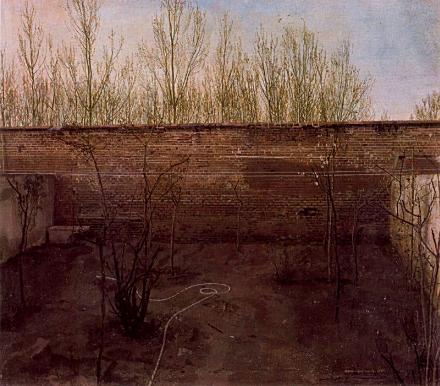
El jardķn de atras
1969
Antonio Lopez Garcia
_______________________
In the Twilight of the Social State
Rethinking Walter Benjamin's Angel of History
Henry A. Giroux
We need to return to Benjamin's angel of history in order to reimagine what it means to reconstruct a social state that invests in people rather than in the rich, mega corporations, the prison-industrial complex and a permanent war economy. We need to imagine how the state can be refigured along with the very nature of politics and economics in order to eliminate structural inequality, racism and militarism. Once again, Americans must recognize that something is "profoundly wrong with the way we live today"(52) and that the obsession with wealth, war and violence is at odds with those democratic ideals often invoked in the name of freedom, justice and equality.(....)
War has become a poison that legitimates the corporate state, on the one hand and works in tandem with the punishing state on the other. At the same time, it feeds an inequality that rots American society from within as it turns over matters of democratic governance and rule to corporate swindlers, military leaders and right-wing ideologues. (Tony) Judt gets it right when he argues:
Inequality, then, is not just unattractive in itself; it clearly corresponds to pathological social problems that we cannot hope to address unless we attend to their underlying cause. There is a reason why infant mortality, life expectancy, criminality, the prison population, mental illness, unemployment, obesity, malnutrition, teenage pregnancy, illegal drug use, economic insecurity, personal indebtedness and anxiety are so much more marked in the US and the UK than they are in continental Europe.... Inequality is corrosive. It rots societies from within. The impact of material differences takes a while to show up: but in due course competition for status and goods increases; people feel a growing sense of superiority (or inferiority) based on their possessions; prejudice towards those on the lower ranks of the social ladder hardens; crime spikes and the pathologies of social disadvantage become ever more marked. The legacy of unregulated wealth creation is bitter indeed.
If we are to imagine another type of society than the one we have, we will have to once again put the social question on the political agenda in order to understand how "the pathologies of inequality and poverty - crime, alcoholism, violence and mental illness - have all multiplied commensurately," and how we might take up the challenge of addressing the symptoms of social dysfunction through a concerted effort to embrace communal freedom, social investments, social rights, civic duties and a vocabulary for translating private troubles into public issues. The return of the social question necessitates invoking a public language and a new set of questions regarding "What should be done to alleviate the suffering and injustices to which the urban working masses [are] now exposed and how [is] the ruling elite of the day to be brought to see the need for change?" The social question also demands that we make visible what C. Wright Mills calls the forces of "organized irresponsibility [that] prevail everywhere," which functions to dissolve crucial social solidarities, undermine compassion, disparage mutual responsibility and disband the bonds of social obligation itself. But if we are to put the social question back on the agenda, we will first have to acknowledge, like Benjamin's angel of history, the "catastrophe that keeps piling wreckage upon wreckage." That catastrophe lies in a brutal and ruthless form of economic Darwinism that shreds the social fabric of the state, eviscerates the importance of the social question and creates the conditions for a society resembling Thomas Hobbes' war of all against all, a survival-of-the-fittest social order in which the flight from freedom and responsibility becomes the default mechanism for upholding a machinery of exploitation, cruelty, inequality and militarism....(more)
_______________________
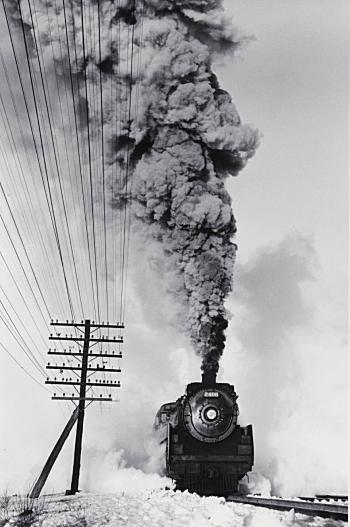
Canadian Pacific Railway
Vaudreiul, PQ, 1960
David Plowden Photographs
Beinecke Rare Book and Manuscript Library
_______________________
North of Invention: A Canadian Poetry Festival
updated schedule
Penn Jan. 20/21 / NYJan. 22/23
a. rawlings • fred wah • christian bök • m. nourbese philip • stephen collis • nicole brossard • jeff derksen • jordan scott • adeena karasick • lisa robertson
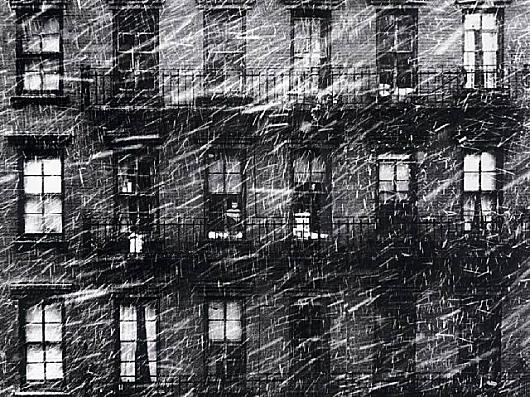
Falling Snow, Boy in Window
Paul Himmel
circa 1949
_______________________
Winter Poems
six Vancouver Island poets
video - Times Colonist
_______________________
Winter’s Philosophers
Charles Simic
(....)
If only Plato and Socrates had to scrape the ice off their windshields and deal with dead car batteries, I was going to add, when the horrifying realization struck me that, despite our interminable New Hampshire winters and our supposedly heightened state of intelligence, we’ve never of late up here produced one philosopher that anyone would care to remember. So, this uncanny feeling that I have, when I get up in the middle of the night and tiptoe on bare feet down to the cold kitchen to peek at the thermometer outside, that I’m on the verge of a supreme insight, something worthy of Blaise Pascal contemplating the silence of the infinite universe, turns out to be all hooey. Well, perhaps not entirely: the one whose mind is clear senses himself free, a master of his destiny. Who says philosophy is incompatible with hard labor of self-preservation? When I’m shoveling snow off the roof I sneak admiring glances at myself as if I were Nietzsche’s superman.
*
Still, I can’t help but feel that I’m surrounded by deep thinkers: the young cow standing puzzled in a field covered with first snow; the mutt I’ve been calling Schopenhauer, sighing at the end of his heavy chain, or the other one who reminds me of Karl Marx and who I saw bark at the police in their cruiser as they drove past his house. Even the lake about to freeze appears mute with indecision and lost in thought. As for cats, there must be at least a couple of Wittgensteins slinking around back porches in the vicinity and one large, long-haired black tabby who comes to rub himself against my leg now and then and whom I’ve named after Boethius, who wrote Consolation of Philosophy, one of the most popular books in Medieval Europe. ...(more)
_______________________
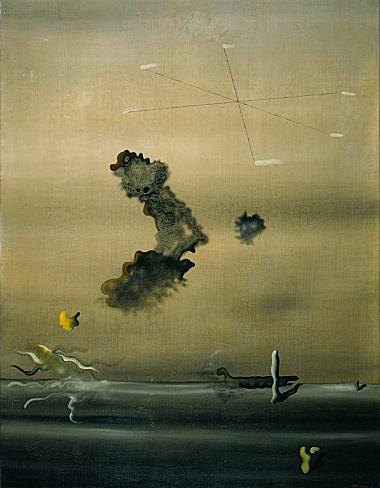
Dehors [Outside]
Yves Tanguy
1929
_______________________
Book Three: Romance
Elizabeth Robinson
conjunctions
(after Eve’s Ransom by George Gissing)
All life sets itself upon us like a dull, iron-colored grief,
and the discipline is
to realize that we haven’t died
yet.
In the story, the protagonist has no basis for hope.
In the story, the protagonist ends with a shout of joy,
and we believe this exclamation.
Yet it is hard, very difficult, to understand from whose
point of view the story is told, to understand that neutrality
functions as sympathy.
...(more)
_______________________

Yves Tanguy
b. Jan. 5, 1900
_______________________
Evening Will Come: A Monthly Journal of Poetics
Issue 1
(January 2011)
In a Word, a World
C.D. Wright
I love them all.
I love that a handful, a mouthful gets you by, a satchelful can land you a job, a well-chosen clutch of them could get you laid, and that a solitary word can initiate a stampede, and therefore can be formally outlawed—even by a liberal court bent on defending a constitution guaranteeing unimpeded utterance. I love that the Argentine gaucho has over two hundred words for the coloration of horses and the Eskimo a flurry of words for snow. More than the pristine, I love the filthy ones for their descriptive talent as well as transgressive nature. I love the dirty ones more than the minced, in that I respect extravagant expression more than reserved. I admire reserve, especially when taken to an ascetic nth. I love the particular lexicons of particular occupations. The substrate of those activities. The nomenclatures within nomenclatures. I am of the unaccredited school that believes animals did not exist until Adam assigned them names. My relationship to the word is anything but scientific, it is a matter of faith on my part, that the word endows material substance, by setting the thing named apart from all else. Horse, then, unhorses what is not horse....(more)
_______________________
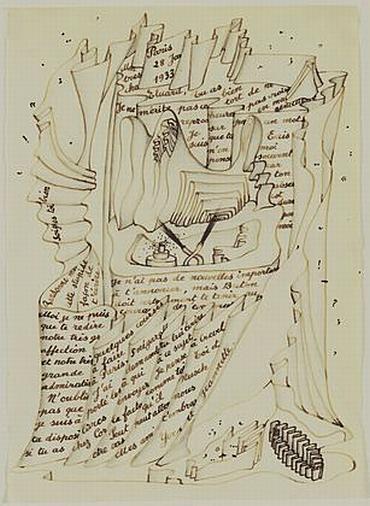
Letter to Paul Eluard
Yves Tanguy
1933
_______________________
Schizo-Culture
Semiotext(e)
Vol. lll, No. 2, 1978
ifile pdf
Special edition edited by Sylvčre Lotringer: Kathy Acker, Lee Breuer, William Burroughs, John Cage, David Cooper, Gilles Deleuze, Douglas Dunn, Richard Foreman, Michel Foucault, John Giorno, Phil Glass, Christopher Knowled, Jean-Franēois Lyotard, Ulrike Meinhof, Jack Smith, Robert Wilson, et al..
_______________________
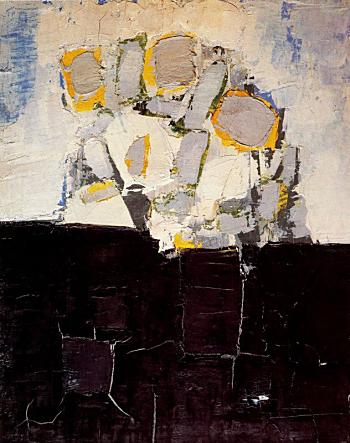
Nicolas de Staėl
January 5, 1914 - March 16, 1955
_______________________
Three Poets
delphicgent
Martin Burke
(....)
*
Silence –even I heaven –half an hour –then more
As if in being Dante’s child I might write it
Or in a madness Holderlin would approve of
Give it form
Silence
Sometimes it seems the dark is all enduring
*
...(more)
delphicgent
“Odds and ends about to be”

Unfinished House in the Woods
near Taos, NM, 1985-88
B/W Photo-Drawings
Rick Dingus
via Ordinary finds
_______________________
from: The Science of Forgetting
Bernadette Mayer and Dave Brinks
conjunctions
Eric’s Joy
none of the unsaid is given
you’ve not known its
unearthing above gnarly roots
nothing you lose can’t
be lost again outside a whiper-ish
strewn tidbit of rotting vegetable
untapped map of a black hole
those silent feet go backwards
recto a.d. recto the slimy darkness
as if that guy koresh were from iraq, youngest
brother of the rat king, dad of
lagnun’s 2nd cousins once removed
moon rat and another nin
what chance atonality don’t I hate?
aren’t zombies to be annihilated?
do shout out in random syllables
so the not-I won’t know all the rocks
are wrong for any beginning
...(more)
_______________________
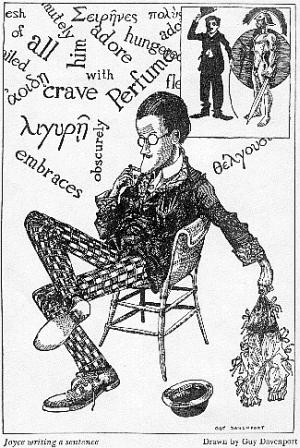
Guy Davenport
d. Jan. 4, 2005
Guy Davenport on Wittgenstein
from The Geography of the Imagination
(....)
Wittgenstein did not argue; he merely thought himself into subtler and deeper problems The record which three of his students have made of his lectures and conversations at Cambridge discloses a man tragically honest and wonderfully, astoundingly absurd. In every memoir of him we meet a man we are hungry to know more about, for even if his every sentence remains opaque to us, it is clear that the archaic transparency of his thought is like nothing that philosophy has seen for thousands of years. It is also clear that he was trying to be wise and to make others wise. He lived in the world, and for the world. He came to believe that a normal, honest human being could not be a professor. It is the academy that gave him his reputation of impenetrable abstruseness; never has a man deserved a reputation less. Disciples who came to him expecting to find a man of incredibly deep learning found a man who saw mankind held together by suffering alone, and he invariably advised them to be as kind as possible to others.
Guy Davenport, The Art of Fiction No. 174
Interviewed by John Jeremiah Sullivan paris review
The Geography of the Imagination: Forty Essays
Guy Davenport google books
7 Greeks
Translations by Guy Davenport
google books
Objects on a Table: Harmonious Disarray in Art and Literature
Guy Davenport
google books
“The Renaissance of 1910”:
Reflections on Guy Davenport’s Poetics
Marjorie Perloff
_______________________

Self-Portrait
c. 1927
Claude Cahun
(Lucy Renée Mathilde Schwob)
1894 - 1954
Claude Cahun: A Sensual Politics of Photography
Gen Doy
megaupload pdf
.....................................................
Many critics and historians, especially feminist art historians, have interpreted Cahun's works by reading backwards from the work of more recent photographers such as Cindy Sherman, and thus categorizing Cahun's self images as postmodern performances of fragmented and mutable selves. In many ways, this has neutralized Cahun's increasingly important commitment to developing a creatively political body of work. Though interested in Trotsky and his politics, she experienced some of the problems that many left-wing creative people encountered when she tried to bring together in her own person the world of working-class struggle and the contempt for bourgeois culture and politics felt by avant-garde artists and writers. However to her great credit, she and her partner Suzanne Malherbe stood by their political principles and put their lives at risk by producing anti-Nazi visual propaganda during the occupation of Jersey (where the couple lived) in World War II.
It is good to focus on "another reading" of Cahun's work, in terms of its political impact. Her work camouflaged her political message - visual manifestations of the working-class struggle and bourgeois contempt - in aesthetic, arousing, surreal photographic constructions. She used the subversive potential of sex and gender questioning to be "seductive and suggestive and thus, ultimately, more politically engaging and involving for the spectator." In this sense, her work has proved timeless and very relevant to her postmodern successors.
Cahun was not a technically adventurous photographer, and her techniques were developed to allow her to visualize her ideas, which were adventurous and the images she produced have stood the test of time. So much so, that when she was "rediscovered" in the early 1990s, she was compared to Sherman and other more recent artists such as Francesca Woodman, as she seemed so (post)modern. However the true worth of her work is her ability "to take herself seriously," literally and metaphorically. Her work may seem playful, but underlying it is a serious and principled commitment to the self in relation to the sexuality and politics.
- Gen Doy
_______________________
Cognition Against Narrative:
Six Essays on Contemporary Cognitive Fiction
Joseph Tabbi
electronic book review
To judge by the gathering of essay-reviews in this issue of American Book Review, current cognitive fictions would seem closer to Kafka than to mainstream narratives, more a matter of suggestions and hints beyond consciousness than a construction of stories we tell ourselves about ourselves - "all false," as Thomas Pynchon says in Gravity's Rainbow (1973). Those novelists who picked up early on research in neuroscience, notably Joseph McElroy, Don DeLillo, and Lynne Tillman, model "the layered brain" not with conventional stories and plots but in "a quiet art of suggestive juxtaposition," as Stephen Burn writes in his EBR BONDinternal linkcontributionoutbound link to this issue. Authors of electronic literature, working in environments that, like the brain, are also layered and multi-mediated, are likely to eschew conventional, linear plot lines for hypertextual, hypermediated narratives in which language is a minority element, a niche within the overall mental and medial ecology.
Why, then, is a preference for conventional narrative still so prevalent among scientists and philosophers of mind? Just as popular fictions hold on to narrative models which are, in essence, derivations of nineteenth-century realism, so too do the majority of cognitive scientists - those, at least, with a general readership - hold on to popular claims about narrativity that the philosopher Gaylen Strawson has identified and critiqued in his provocative article "Against Narrativity":
I argue against two popular claims. The first is a descriptive, empirical thesis about the nature of ordinary human experience: "each of us constructs and lives a 'narrative'...this narrative is us, our identities" (Oliver Sacks); "self is a perpetually rewritten story...in the end, we become the autobiographical narratives by which we 'tell about' our lives" (Jerry Bruner); "we are all virtuoso novelists.... We try to make all of our material cohere into a single good story. And that story is our autobiography. The chief fictional character...of that autobiography is one's self" (Daniel Dennett). The second is a normative, ethical claim: we ought to live our lives narratively, or as a story; a "basic condition of making sense of ourselves is that we grasp our lives in a narrative" and have an understanding of our lives "as an unfolding story" (Charles Taylor). A person "creates his identity [only] by forming an autobiographical narrative - a story of his life," and must be in possession of a full and "explicit narrative [of his life] to develop fully as a person" (Marya Schechtman).
Strawson I think rightly points out that valuing narrative is a choice, and experiencing oneself and one's life as a narrative is by no means self-evident or universal. In any case, conventional, character-based storytelling cannot be said to receive much support from science: we can believe (but not prove by experiment) that the gathering together of experience in narrative is somehow natural, and we can think that conceiving our lives as a narrative is a good thing. But there isn't much either in cognitive science or the long history of fiction to support this. ...(more)
_______________________
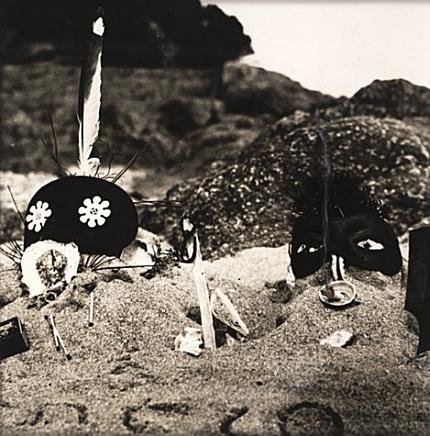
Entre nous
Claude Cahun
1926
Claude Cahun, "Je est une autre" in PURPOSE #7
_______________________
The Pedestal Magazine
Issue 61 (Ten-Year Anniversary)
December 21, 2010-February 21, 2011
_______________________
Journal of Surrealism and the Americas
Vol 4, No 1 (2010)
_______________________
The outstanding question from the get-go of 2011 is just this: can a political economy be kept floating along like a Winnie-the-Pooh balloon on gusts of sheer fakery? To me, the simple answer is no. The people running things in the USA have tried everything from pervasive accounting fraud to complete opacity in trading procedures to looting the republic's future. The consensus trance of "recovery" makes itself manifest through every conduit of public utterance - cable TV news, The New York Times, the pronouncements of every last elected official - even though the Consumer Price Index omits items such as food, gasoline, and heating oil in its calibrations, while heaping on fictional "hedonic" adjustments.
What's left of the American economy is a web of financial rackets divorced from the production of real wealth, dependent on an elaborate computerized three-card-monte edifice of swindling. Those groans and creakings you hear are the agonies of this ediface swaying under its burden of lies, while underneath it the ground of history shifts.
-
James Howard Kunstler
_______________________
Politics and Culture
Edition 2010 Issues 3 & 4
THE LEFT AT WAR WITH ITSELF: A Special Double-Issue Devoted to Discussing Michael Bérubé's "The Left At War" & the Questions it Raises (Guest-Edited by Gabriel Noah Brahm & Gregory J. Lobo)
_______________________

Claude Cahun
_______________________
Human Capital Or Toxic Asset: After The Wage
part 1
Marina Vishmidt
Reartikulacija
This is a sequence of reflections on affirmation and negation, on identification and severance: determinate negation as strategic affirmation, the identification of concrete universals and severance from a defunct relation. These lines will be explored with reference to the current situation of the waged and unwaged working class, most proximately in Britain, as “debt” becomes the ideological white noise and the practical horizon of all social and political imagination. Household indebtedness is confused with the state deficit in the spontaneous ideology of the Conservative austerity agenda, as what remains of the crisis-riddled economy is sacrificed to the “debt” – as poor people to loan sharks, so Britain to the bond investors. The nationalist narrative of “we’re all in this together” eliminates any space for discussion as to who might bear greater responsibility for the crisis, and who should be paying for it. The announced cuts make it all too clear – it’s the bloated public sector and welfare payments which are responsible, and those that have the least shall have even that taken away, as the Biblical parable goes. Yet a fatalistic consensus prevails for now, transfixed by a menace beyond dispute: the “debt.”
part 2
Reartikulacija
_______________________

Traces: alleyways & spandrels
Timothy Atherton
McMullen Art Gallery, Edmonton
_______________________
A Translation of Einfach kompliziert by Thomas Bernhard
Douglas Robertson(....)Made of dust
I have outrun stupidity
Curricular
Extracurricular horror
But if we had not had our seizures
lifts the hammer high into the air and looks around
My heart made into a den of thieves
Intellectual experience
No temperament for ministration
lets his hand and the hammer fall, exhausted
We concoct ourselves our own unhappiness
Like an unappetizing soup
and spoon it up
voraciously
glances at the door
(....) ...(more)
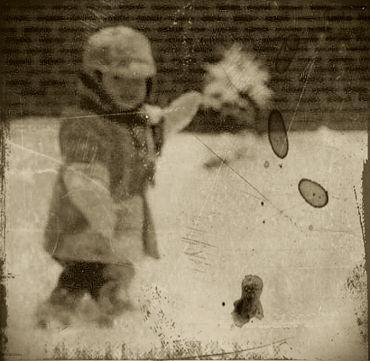
myself c.1953
some time before I started worrying
about acquiring a mind of winter
_______________________
“It is a little embarrassing, that after 45 years of research and study, the best advice I can give to people is to try to be a little kinder to each other.”
-
Aldous Huxley via Wirearchy
_______________________
Image Nation 19 (the wand
Robin Blaser
(1981-1988)
I have told many things and want
to tell more in a small time to count far off,
since 'nothing distinguishes me
ontologically from a crystal, a plant,
an animal, or the order of the world'
simply
and 'we drift together toward
the noise and the black depths
of the universe' celebrate the
sudden hang-up of our visibility,
celebrate the sudden beauty that
is not ourselves careless unwrapped
(ducis) the solar origin drifts
in the same boat
what did
dance in this dancer was
first the difference among poppies and
white horses of advertisements,
the snow-storm and the grapes
from Africa and the smile, exactly
and repetitions, but joyous, wintering
in Sais, writing memorable letters out
of the shattered various crystals, rocks, grottoes,
leaves, insects, animals, large and
small 'plenitude and enchainment,
wings, eggshells, clouds and snows'
(....)
the infinite who belongs to this race
of many things, the gentle death,
ignorance, and innocence last
summer, the youth of it, the
violence with roses and ivy,
sensible words, laughing rose
petal or someone the inner
music has worn out—amidst broad
leaves and harbours, linked to
the observer, submerged
or proximous, exactly like that
which he loves, startling noise,
clarity and shadow, the heights
of ourselves equal to our shadows,
night and day, the miracle of
many things, the 'proliferation
of geneses'
...(more)
from The Holy Forest
_______________________
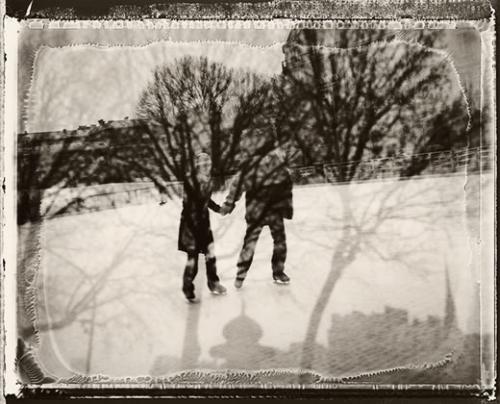
Exposed Cities - Paris
Guillaume Zuili
_______________________
Fernando Pessoa (1888-1935):
Inscriptions, 1920, from English Poems, Lisbon, 1921
Tom Clark
XII
Life lived us, not we life. We, as bees sip,
Looked, talked and had. Trees grow as we did last.
We loved the gods but as we see a ship.
Never aware of being aware, we passed.
_______________________
personal myth and character
Roger Gathman
(....)If we provisionally take it that Heller is right, and that personal myth is a sign of the breakdown of myth, then we have a different angle from which to look at what Engels called the uprooting of a population from ‘apathy’.”
Now that I am thinking about the myth of the homo economicus, I am wondering whether these notions of myth apply – whether, in the same way that the personal myth papers over a repressed memory, the myth of the homo economicus is a way of creating a tight-knit structure that conceals an ancient act of repression....(more)
_______________________
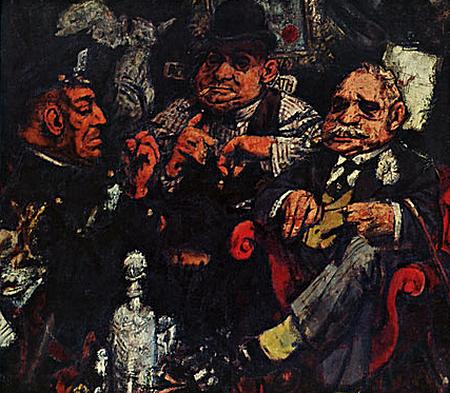
The Feast of Pure Reason
Jack Levine
January 3, 1915 - November 8, 2010
_______________________
Battle Lines
David Auerbach
Waggish
(....)So I’ve been thinking about the future, and Graham seems to be a pure representative of one side of the two dominant power bases that appear to be duking it out for control of the US right now. The battle is between technocrats and ideologues, Whigs and Tories, libertarians and moralists. To avoid using any loaded terms, I’m just going to create two generic types of my own:
* Type L: libertarian, technocratic, meritocratic, pro-business, anti-government, laissez faire, pro-science, positivist, secular, elitist, progress-driven, Whiggish, optimistic.
“The best should have the power.”
* Type C: tradition-oriented, pro-status quo, nationalistic, protectionist, isolationist, xenophobic, social conservative, pro-business, pro-government (at least in regards to furthering other goals), pro-religion, cronyistic, chauvinistic.
“The powerful should have the power.”
These are not types of voters, but types of people of influence, people who in some way affect the policies that are being made. It’s my own heuristic. I thought about government policies of the last 30 years, from Reagan’s tax cuts to welfare reform to the health care bill, and then excluded all those people whose viewpoints didn’t seem to be reflected in them. This is what I was left with.
(Type C clearly holds assorted beliefs reflected in my less-funny-by-the-day Taxonomy of Conservatives, while Type L has beliefs called out in the taxonomy as not actually being conservative at all.)
If, like most people reading this, you don’t fit into either of these types, congratulations! Your opinion is probably not relevant to the dominant discourse in America. You’ll notice that what is not covered in these two types is any sort of socialist attitude advocating government intervention to encourage equality and welfare. This attitude appears to have vanished amongst the influential forces in American life, possibly owing to the decline of labor unions. When you realize that Paul Krugman is several degrees to the right of John Maynard Keynes, you see exactly how little purchase any sort of genuinely socialist attitude has in the country....(more)
_______________________
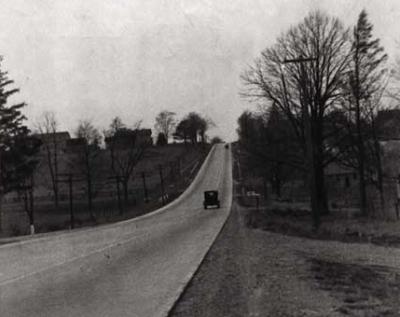
Ilya Ilf
Poemas del rķo Wang
_______________________
The bond of the awkward
Adam Kotsko
guardian
As the likes of Mad Men and Peep Show demonstrate, nothing brings people together quite like the breaking of social norms
_______________________
Welcome to The New Old Emptybottle
Stavros the Wonderchicken returns
*tap* *tap tap tap*
Anybody out there? Anybody left standing with an attention span intact? Any Wonderchicken Irregulars out there, hiding in the bullet-splintered woods, huddled in the snow and blood, waiting for what’s seemed like forever for the smoke and fog to clear, for this long international nightmare to end?
_______________________
Open access in 2010
Peter Suber
_______________________
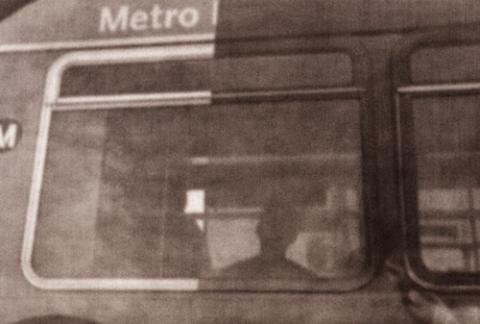
Pinhole photograph
Fragments
photography by
Guillaume Zuili
lens culture
_______________________
How to Build a Universe That Doesn't Fall Apart Two Days Later
Philip K. Dick, 1978
(....)
The basic tool for the manipulation of reality is the manipulation of words. If you can control the meaning of words, you can control the people who must use the words. George Orwell made this clear in his novel 1984. But another way to control the minds of people is to control their perceptions. If you can get them to see the world as you do, they will think as you do. Comprehension follows perception. How do you get them to see the reality you see? After all, it is only one reality out of many. Images are a basic constituent: pictures. ... Our memories are spurious, like our memories of dreams; the blank are filled in retrospectively. And falsified. We have participated unknowingly in the creation of a spurious reality, and then we have obligingly fed it to ourselves. We have colluded in our own doom. ...(more)
|
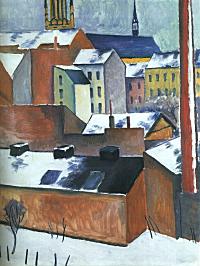
 Janus Head
Janus Head

 The Age of Briggs & Stratton
The Age of Briggs & Stratton



































